Looking after our heart health and managing high blood pressure is key. We’re drawn to natural ways to keep our hearts healthy. This article will show you effective methods to lower your blood pressure without just using medicine. If you’re fighting hypertension or want to boost your heart health, you’ll find science-backed tips here.
Key Takeaways
- Discover effective natural remedies to lower blood pressure
- Understand the symptoms and risk factors associated with high blood pressure
- Learn how dietary changes, including reducing sodium intake and increasing potassium-rich foods, can help lower blood pressure
- Explore exercise routines and physical activity as a natural way to improve heart health
- Discover stress management techniques, such as mindfulness and breathing exercises, to support blood pressure reduction
Understanding High Blood Pressure
High blood pressure, also known as hypertension, affects millions globally. It happens when blood flow pressure is too high. This strain can harm your heart and blood vessels over time. Knowing the signs and risks of hypertension helps you manage your heart health.
Symptoms and Risk Factors
High blood pressure often has no clear symptoms, earning it the “silent killer” nickname. Yet, some may feel headaches, dizziness, or chest pain. Key risk factors include:
- Age (risk increases as you get older)
- Family history of high blood pressure
- Excess weight or obesity
- Lack of physical activity
- Poor diet high in sodium, fat, and sugar
- Excessive alcohol consumption
- Stress and anxiety
- Certain medical conditions like diabetes or kidney disease
Consequences of Uncontrolled Hypertension
Unmanaged high blood pressure can cause serious health issues, such as:
- Heart disease and heart attacks
- Stroke
- Kidney damage or failure
- Vision loss
- Erectile dysfunction
Fortunately, managing high blood pressure is possible through lifestyle changes, diet, and sometimes medication. By understanding the risks and acting early, you can lower your risk of these serious conditions.
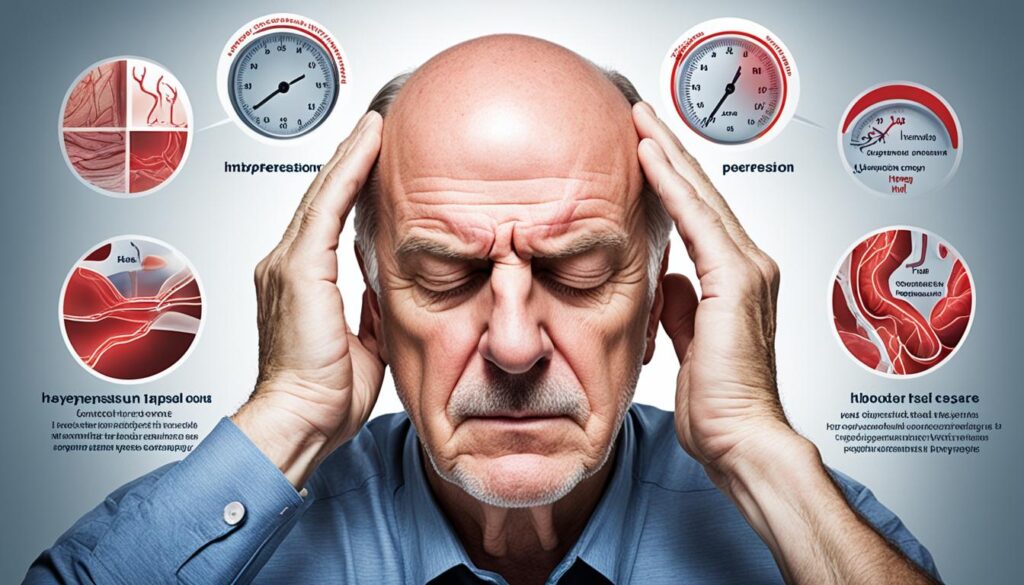
“Controlling high blood pressure is one of the most important things you can do to improve your overall heart health.”
Dietary Changes for Lower Blood Pressure
Keeping a healthy diet is key to managing high blood pressure. By making smart food choices, you can cut down on sodium and eat more potassium-rich foods. These changes help lower your blood pressure.
Reducing Sodium Intake
Too much sodium can raise your blood pressure. To lower it, you should eat less sodium. Begin by checking nutrition labels and choose low-sodium options when you can. Stay away from processed and canned foods, which are often high in sodium. Eat more fresh, whole foods instead.
- Limit your daily sodium intake to no more than 2,300 milligrams.
- Use herbs, spices, and citrus to flavor your meals instead of salt.
- Don’t add salt at the table, and watch out for high-sodium condiments like soy sauce, ketchup, and salad dressings.
Increasing Potassium-Rich Foods
Potassium is important for balancing sodium levels and keeping blood pressure healthy. Eating more potassium-rich foods can help fight the effects of sodium. This can lead to lower blood pressure.
| Food | Potassium Content (mg per serving) |
|---|---|
| Bananas | 422 |
| Avocados | 485 |
| Spinach | 167 |
| Sweet Potatoes | 541 |
| Salmon | 534 |
By eating less sodium and more potassium, you can help lower your blood pressure naturally. Always talk to your doctor to create a diet plan that fits your health goals and needs.

Exercise Routines and Physical Activity
Sticking to a regular exercise plan can lower your blood pressure naturally. It boosts your heart health, cuts stress, and boosts your overall health.
Adding different exercise routines to your life can really help your blood pressure. You can try aerobic exercises or strength training. These can help you get lower blood pressure.
Aerobic Exercises
- Brisk walking
- Jogging or running
- Swimming
- Cycling
- Dancing
Try to do at least 30 minutes of aerobic activity most days. This will help you see the good effects of physical activity on your blood pressure.
Strength Training
- Resistance exercises using bodyweight or resistance bands
- Weight lifting with free weights or machines
- Yoga and Pilates
Adding strength training to your routine can help build muscle. It also improves flexibility and supports your heart health. All these can help with lower blood pressure.
| Exercise Type | Recommended Frequency | Benefits for Blood Pressure |
|---|---|---|
| Aerobic | 30 minutes, most days | Improves heart health, reduces stress, and promotes weight management |
| Strength Training | 2-3 times per week | Builds muscle, improves flexibility, and supports cardiovascular health |
By mixing up your exercise routines and physical activity, you can work towards lower blood pressure naturally.

Stress Management Techniques
Stress can really affect your blood pressure. It’s key to use good stress management techniques. We’ll look at mindfulness, meditation, and breathing exercises. These can help you relax and support your heart health.
Mindfulness and Meditation Practices
Mindfulness and meditation are great for managing stress and lowering blood pressure. They help you focus on now and find calm inside. Studies show that regular meditation can lower blood pressure, improve heart health, and reduce the risk of hypertension.
Breathing Exercises for Relaxation
Adding breathing exercises to your daily life can help with stress and lower blood pressure. Deep breathing works with your body’s “rest and digest” system. This can make your heart rate, blood pressure, and muscle tension go down. It helps you feel relaxed and calm.
“Consistent practice of mindfulness and breathing exercises can have a profound impact on your stress levels and overall cardiovascular health.”
Start with 5-10 minutes a day of mindfulness meditation or simple breathing exercises. Over time, these can become key to managing stress. They help keep your blood pressure healthy and your mind balanced.

| Stress Management Technique | Benefits for Blood Pressure |
|---|---|
| Mindfulness Meditation | Reduces physiological effects of stress, lowers blood pressure |
| Diaphragmatic Breathing | Activates the parasympathetic nervous system, promotes relaxation |
lower blood pressure, natural remedies, heart health, hypertension
Many people are looking for natural ways to manage high blood pressure instead of traditional medicine. These methods help lower blood pressure and improve heart health. We’ll look at some natural remedies that work well for hypertension.
Changing your diet is a key natural strategy for healthy blood pressure. Eating less sodium and more potassium-rich foods like leafy greens, bananas, and avocados is helpful. Adding regular exercise and stress management like mindfulness can also help keep your blood pressure in check.
Some people also use herbal supplements and natural remedies like garlic, hibiscus tea, and omega-3 fatty acids to help with blood pressure and heart health. But, always talk to a doctor before trying these supplements.
Using a mix of diet changes, exercise, stress management, and natural remedies can help you manage your blood pressure and improve your heart health. Remember, being consistent and patient is important for seeing good results.
“The journey to better heart health starts with small, manageable steps. By embracing natural remedies, you can reclaim your well-being and live a healthier, more vibrant life.” – Dr. Sarah Michaels, Cardiologist

Weight Loss Strategies
Keeping a healthy weight can greatly improve your blood pressure. We’ll look at ways to lose weight, like eating healthy and exercising regularly.
Healthy Eating Habits
Starting with healthy eating is key to a good weight. Eat more whole, plant-based foods like fruits, veggies, whole grains, and lean meats. Cut down on processed, salty, and sugary foods. Watch how much you eat and drink plenty of water to help with weight loss.
Regular Exercise Routine
Exercise is vital for losing weight and heart health. Try to do at least 150 minutes of moderate exercise each week, like walking, swimming, or biking. Adding strength training helps build muscle and speeds up your metabolism. Mix up your activities to keep it fun and doable.
By eating well and exercising regularly, you can manage your weight and lower your blood pressure naturally.

“The key to successful weight loss is to adopt a healthy lifestyle that you can maintain over the long term.”
Herbal Supplements and Natural Remedies
Herbal supplements and natural remedies can help manage high blood pressure. They are plant-based solutions that support heart health and lower blood pressure. These options have been studied for their benefits.
Garlic is a promising natural remedy. Studies show that garlic supplements can widen blood vessels and improve circulation. This can help lower blood pressure in people with hypertension. Garlic’s active compounds, like allicin, are key to these effects.
Hibiscus is another herb to consider. It’s been used for centuries in traditional medicine. Recent studies suggest it can lower blood pressure by acting as a mild diuretic and reducing inflammation.
- Garlic supplements
- Hibiscus tea or extracts
- Hawthorn berry
- Omega-3 fatty acids
- Coenzyme Q10
Other natural remedies like hawthorn berry, omega-3 fatty acids, and coenzyme Q10 are being studied for blood pressure support. They might be used along with lifestyle changes and medical treatment.
| Herbal Supplement | Potential Benefits | Dosage Range |
|---|---|---|
| Garlic | Improves circulation, dilates blood vessels, reduces blood pressure | 600-1,200 mg per day of aged garlic extract |
| Hibiscus | Acts as a mild diuretic, reduces inflammation, lowers blood pressure | 240-500 mg per day of hibiscus extract or 1-2 cups of hibiscus tea daily |
| Hawthorn Berry | Improves blood flow, supports heart health, may lower blood pressure | 300-600 mg per day of hawthorn berry extract |
While these natural remedies show promise, they shouldn’t replace medical treatment. Always talk to your healthcare provider before adding them to your routine. This is especially true if you’re on medication or have health conditions.

“The benefits of these natural approaches to blood pressure management are becoming increasingly recognized, but they should be used in conjunction with, not instead of, standard medical care.”
Lifestyle Modifications for Better Heart Health
Making lasting changes in your lifestyle can greatly improve your heart health and lower your blood pressure. We’ll look at the benefits of quitting smoking and drinking less alcohol. These changes can greatly affect your heart health.
Quitting Smoking
Smoking is a big risk for heart disease. It damages blood vessels and raises the chance of heart attack and stroke. Quitting smoking brings big benefits for your heart health.
Within a year of quitting, your risk of heart disease cuts in half. After 15 years, your risk is the same as someone who never smoked.
To quit smoking, consider these steps:
- Get help from your doctor or a smoking cessation program
- Avoid things that make you want to smoke
- Use nicotine replacement like patches or gum
- Find healthy ways to deal with stress and anxiety, like exercise or meditation
Limiting Alcohol Consumption
Drinking too much alcohol is bad for your heart. It can raise your blood pressure and increase the risk of heart disease. It can also lead to weight gain. It’s best to limit alcohol to one drink a day for women and two for men.
To drink less alcohol, try these tips:
- Set a daily or weekly limit for drinking
- Drink water or non-alcoholic drinks between alcoholic ones
- Have friends or family to keep you on track
- Look for non-alcoholic drinks that you enjoy
By making these changes, you’re taking a big step towards better heart health and lower blood pressure. Remember, small, steady changes can make a big difference in your health.

Monitoring and Tracking Progress
It’s key to regularly check your blood pressure to see how well the natural remedies and lifestyle changes work. Using a home blood pressure monitor can give you important info about your heart health. It helps you keep up with managing your high blood pressure.
Home Blood Pressure Monitoring
Getting a good home blood pressure monitor is easy and handy. It lets you keep an eye on your blood pressure levels. By taking readings often, you can see how your health changes and spot any big changes or issues.
This info helps you make smart choices about your treatment and lifestyle. Monitoring progress is important.
For blood pressure monitoring, being consistent is crucial. Try to check your blood pressure at the same time every day. Morning and evening readings give you a full view of your blood pressure. Remember, things like stress, exercise, and caffeine can change your readings.
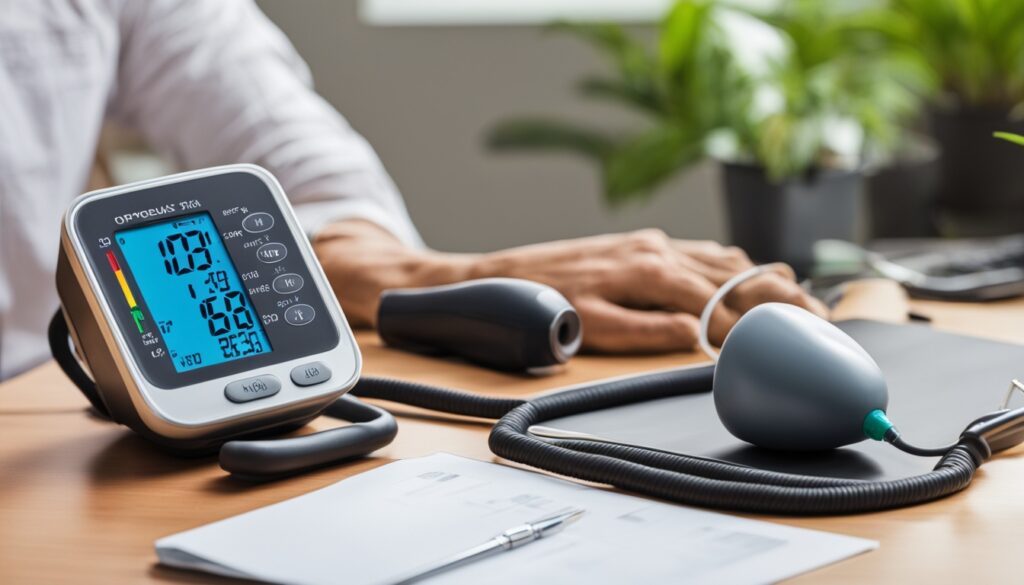
By tracking your progress closely, you can see which natural remedies and lifestyle changes work best for you. This lets you make smart choices and improve your heart health.
“Regularly monitoring your blood pressure is crucial for understanding the effectiveness of your hypertension management plan.”
Combining Natural Approaches
For the best results in lowering blood pressure, mixing different natural methods works well. Adding various changes to your diet, exercise, stress levels, and lifestyle can lead to lasting and significant blood pressure drops.
Start by eating less sodium and more potassium-rich foods. This combo helps balance your body’s electrolytes and keeps blood pressure in check. Add in regular exercise like cardio and weightlifting to boost the benefits even more.
Don’t forget about stress management. Techniques like mindfulness meditation and deep breathing can help control stress, a big factor in high blood pressure. By tackling all these areas, you can greatly improve your blood pressure for the long run.
It’s important to try different natural remedies to see what suits you best. With time and effort, you can manage your blood pressure and enhance your heart health.
When to Seek Medical Advice
Natural remedies and lifestyle changes can help manage hypertension. But, there are times when you should talk to a healthcare professional. Knowing when to get medical advice is key, especially if you have a history of high blood pressure or other health issues.
If you notice any of these signs, it’s time to see your doctor:
- Your blood pressure stays high even after making lifestyle changes.
- You feel chest pain, have trouble breathing, or feel dizzy.
- You have a family history of hypertension or heart disease.
- You’re taking medicines that could affect natural remedies or supplements.
- You have health conditions like diabetes or kidney disease that high blood pressure can worsen.
Your doctor can give you advice tailored to your needs. This might include changing your lifestyle, taking medicine, and regular check-ups. Working with your healthcare provider ensures your hypertension is under control and your health is the best it can be.
“The first step in managing high blood pressure is to seek medical advice from a qualified healthcare professional. They can help you develop a comprehensive plan to lower your blood pressure and improve your cardiovascular health.”
It’s always best to be safe when it comes to your health. Don’t wait to make an appointment with your doctor if you’re worried about your blood pressure or overall health.
Conclusion
By using the tips from this article, you can improve your heart health. Making changes to your diet, exercise, stress levels, and weight can greatly help. These changes can make a big difference in your heart’s health.
A complete approach is important for success. Using natural remedies, herbal supplements, and changing your lifestyle can keep your blood pressure healthy. Always check on your progress and get medical advice when needed to make sure you’re on the right track for better heart health.
With hard work and a focus on your health, you can lower your blood pressure naturally. This leads to a healthier and more energetic life. Taking care of your heart health means you’re looking forward to a long and full life.


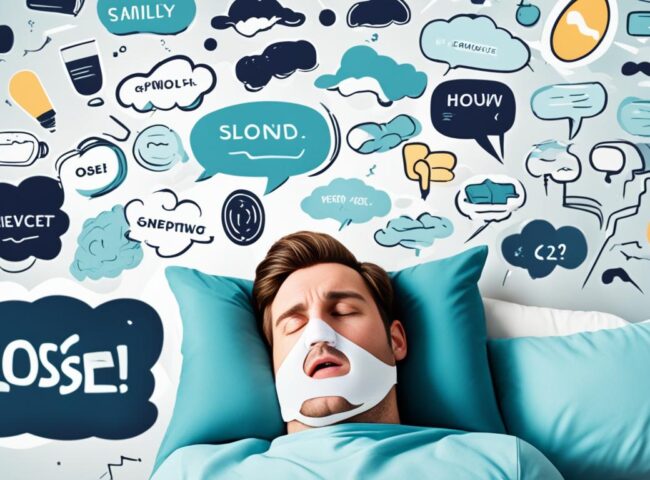
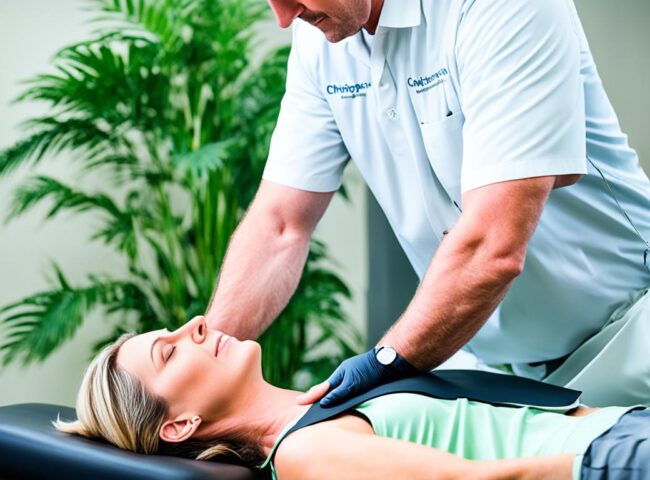

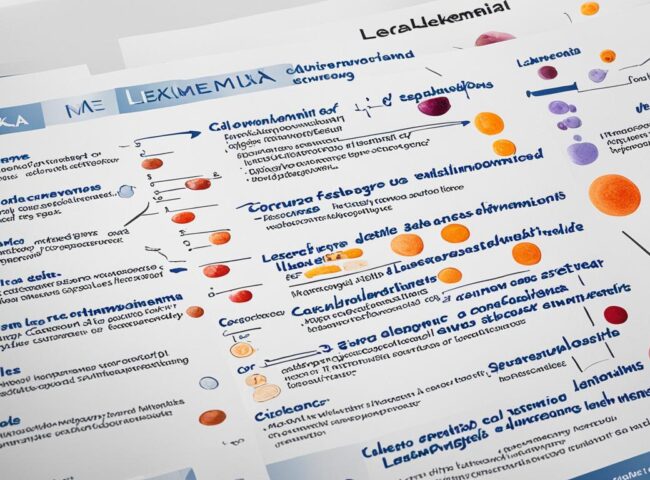
Leave feedback about this